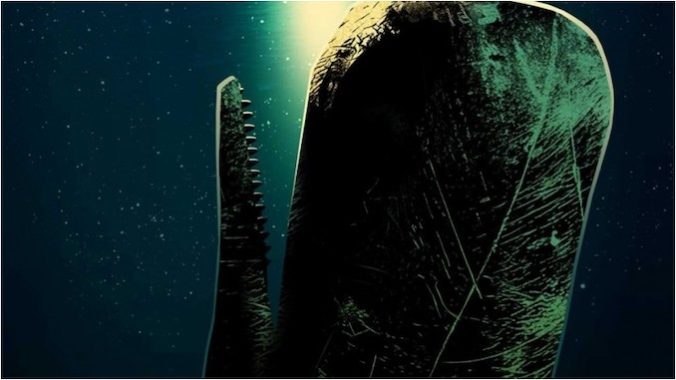Daniel Kraus’ Whalefall Is a Pulse-Pounding, Stunning Achievement

There’s a certain kind of magic that comes from a storyteller laying out a big, bold, easily graspable premise and then promising his audience a version of that premise they’ve never experienced before. I love the ambition of it, the sense of fun that comes with inviting your audience along for a thrill ride that plays with certain instantly recognizable ideas. And in the Biblical sense, Daniel Kraus’ Whalefall is certainly recognizable. It’s the story of a guy getting swallowed by a big fish, something you’ve definitely heard about before whether it’s through the story of Jonah or through the adventures of Pinocchio the Little Wooden Boy.
More importantly, Kraus is a savvy storyteller who knows that you’ve heard about it before, which means he gets to play with your expectations, and your understanding of the horror that might come with such an encounter in real life, to great effect. The result is one of the year’s best genre novels, a terrifying, invigorating, addictive thrill ride that will leave you gasping for air.
Heading down the whale’s gullet for this tale is Jay Gardiner, a young diver who heads out into the depths one day in an effort to retrieve the remains of his father, a legendary local figure who committed suicide the year before. Jay’s carrying with him the typical diving gear, a mesh bag to bring back his father’s bones, and a mountain of guilt over not being there for his father’s decline, an absence brought on by years of complicated feelings between the two men. Now, it’s time for Jay to atone and to at least say he tried to bring his father home.
The ocean, of course, has other plans, and partway through his dive, Jay finds himself caught in a battle between a giant squid and a sperm whale, then shoved down the whale’s throat in the aftermath of the clash between the two behemoths. It’s there that much of the novel’s action takes place, as Jay finds himself coated in a whale’s stomach acid, injured and alone, with an oxygen supply that just keeps ticking down and a memory that won’t stop dredging up his father’s lessons, for good and ill.
-

-

-

-

-

-

-

-

-

-

-

-

-

-

-

-

-

-

-

-

-

-

-

-

-

-

-

-

-

-

-

-

-

-

-

-

-

-

-

-








































